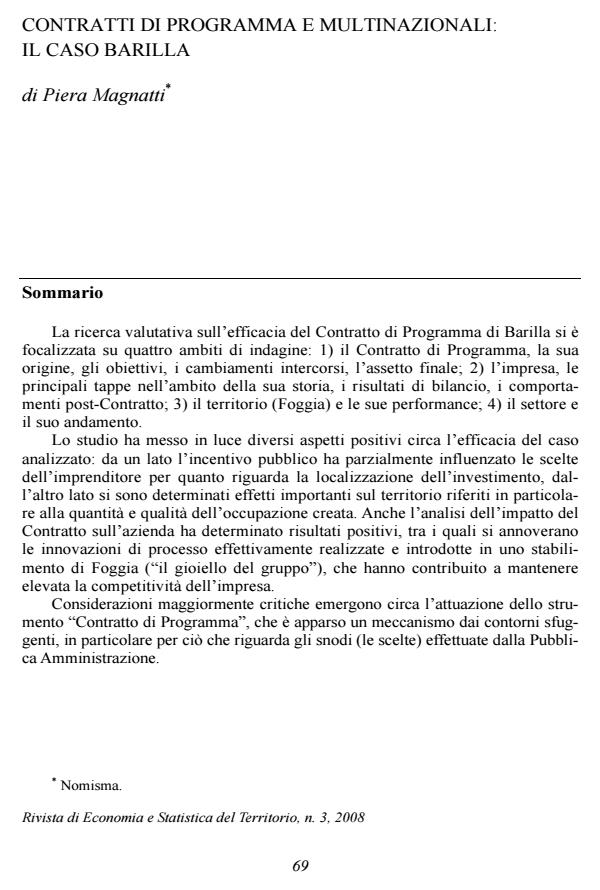Contratti di Programma e multinazionali: il caso Barilla
Titolo Rivista RIVISTA DI ECONOMIA E STATISTICA DEL TERRITORIO
Autori/Curatori Piera Magnatti
Anno di pubblicazione 2009 Fascicolo 2008/3
Lingua Italiano Numero pagine 15 P. 69-83 Dimensione file 185 KB
DOI
Il DOI è il codice a barre della proprietà intellettuale: per saperne di più
clicca qui
Qui sotto puoi vedere in anteprima la prima pagina di questo articolo.
Se questo articolo ti interessa, lo puoi acquistare (e scaricare in formato pdf) seguendo le facili indicazioni per acquistare il download credit. Acquista Download Credits per scaricare questo Articolo in formato PDF

FrancoAngeli è membro della Publishers International Linking Association, Inc (PILA)associazione indipendente e non profit per facilitare (attraverso i servizi tecnologici implementati da CrossRef.org) l’accesso degli studiosi ai contenuti digitali nelle pubblicazioni professionali e scientifiche
Contratti di Programma and Multinational Companies: Barilla Case-study - Objectives The study aimed at evaluating the socio-economic effectiveness of Contratto di Programma signed with Barilla according to the following perspectives: a) additionality; b) local impact; c) effects on the beneficiary (Barilla). Methods Four research activities have been undertaken: 1. the analysis of Contratto di Programma: its origin, objectives, contents and evolution; 2. the firm: its history, performances and post-Contract conduct; 3. the local context and its performances; 4. the sector and its performances. The study has relied on the following sources: the official documentation concerning the Contratto di Programma; the economic press; the economic and financial reports of the companies belonging to the Barilla Group; the official statistics; interviews undertaken with Barilla, the local Administrations and the socioeconomic parties, the University of Foggia, the Government. The results of the study have been influenced by different factors: a) the multiregional approach of the CdP; b) the varies typologies of investment included in the CdP; c) the frequent changes that hare affected the content of the CdP; d) the reorganisation processes that have affected Barilla in that period. Results The study has brought to light various positive aspects concerning the effectiveness of this Contratto di Programma: on the one side, the public incentive has partially influenced the choices of the entrepreneur regarding the localisation of the investment, from the other side important effects have been determined on the local context, in particular on the quality and quantity of the generated employment. Moreover, the analysis of the impact of the CdP on the company has determined positive effects, in particular on process and product innovation (the Foggia plant was considered the jewel of the Group), that have contributed to maintain the competitiveness of the enterprise high. Conclusions Along with the positive effects reported above, some critical considerations concerning the characteristics of the Contratto di Programma emerged. The mechanisms of this incentive tool appeared not completely clear, in particular as far as the selection of the projects (and of the beneficiaries) concerned, with an important role of the so-called political control over decisions (that means a nearly total absence of predefined rules governing the process).
Piera Magnatti, Contratti di Programma e multinazionali: il caso Barilla in "RIVISTA DI ECONOMIA E STATISTICA DEL TERRITORIO" 3/2008, pp 69-83, DOI: